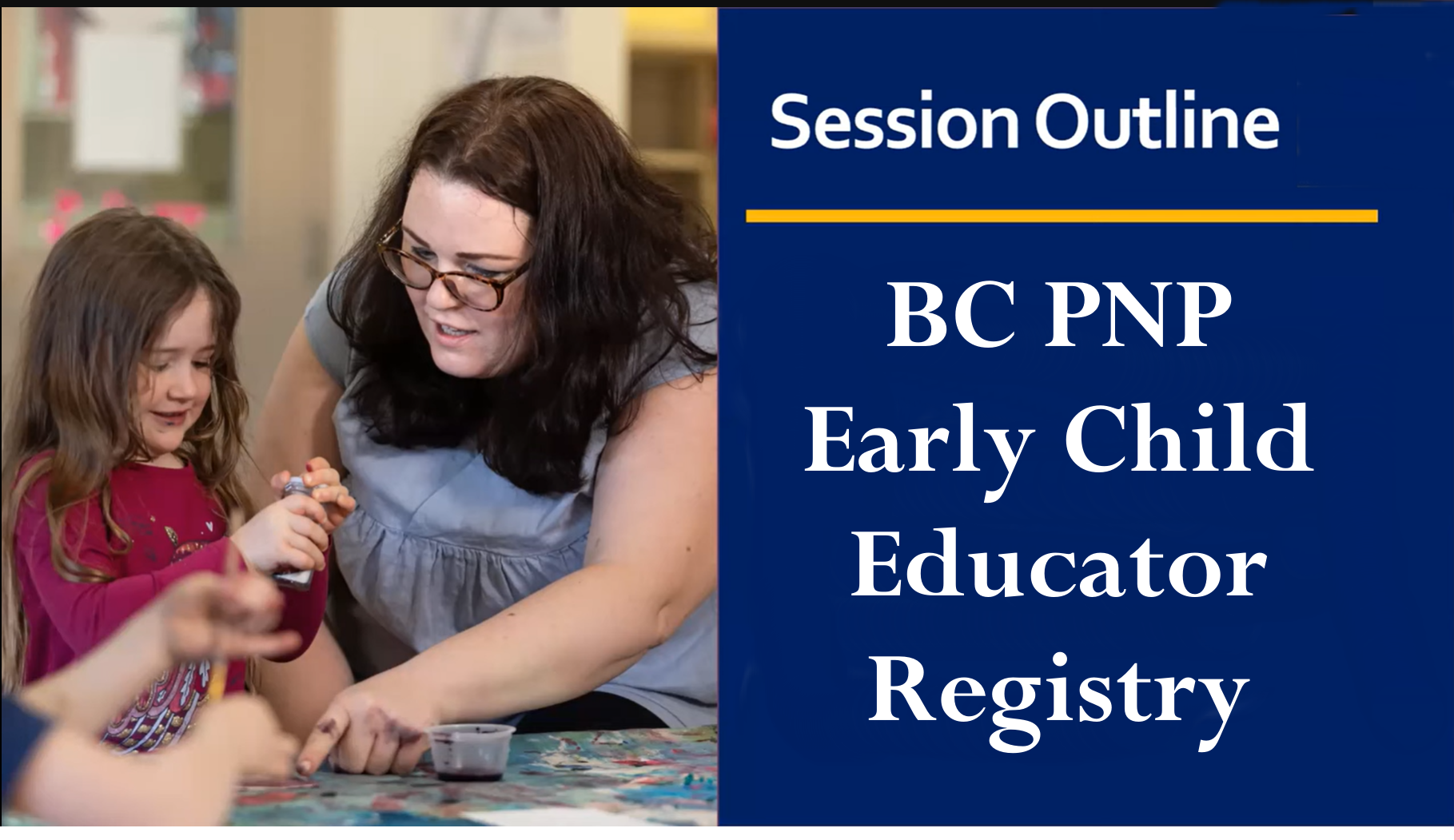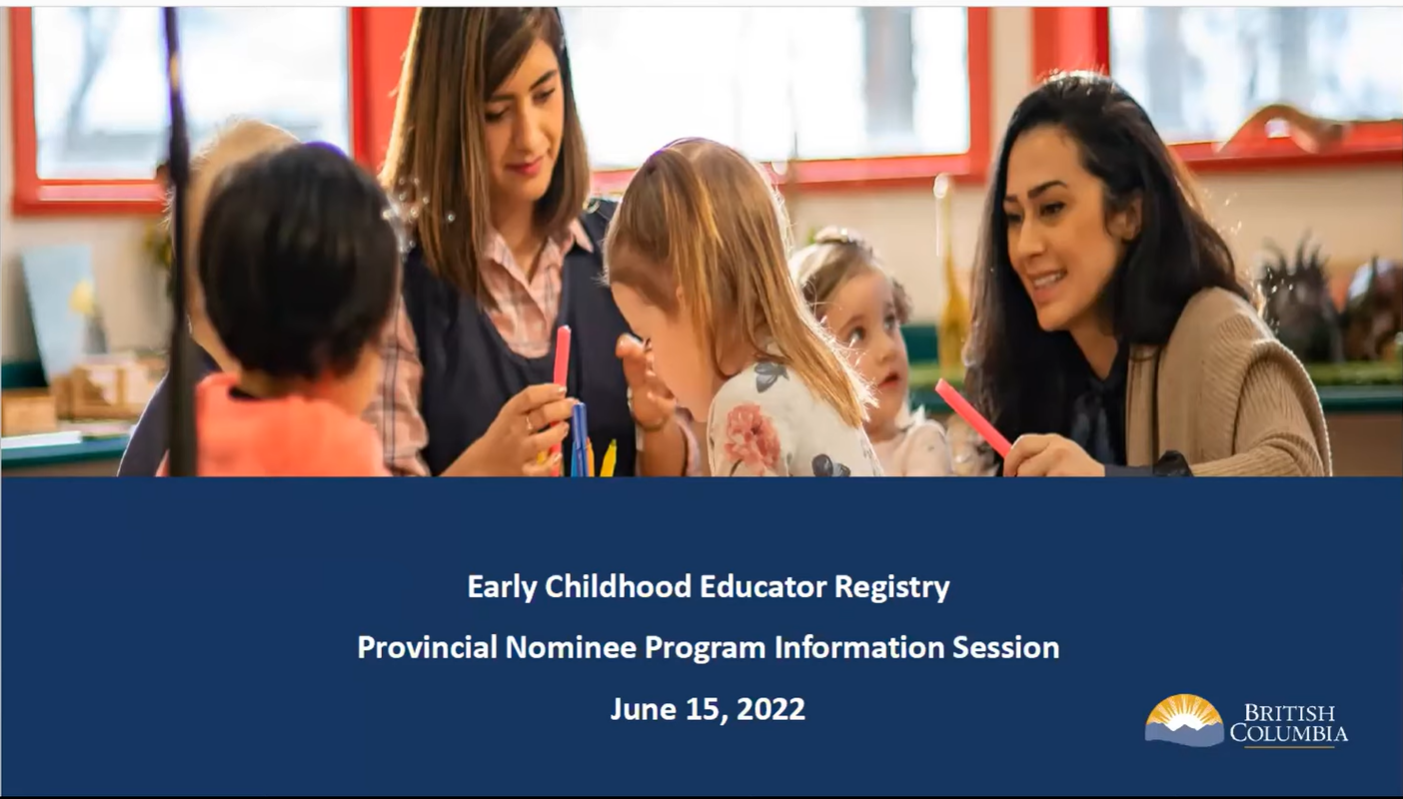

Early Childhood Educator Registry
Presenter : Joanne Merrell, the manager of the professional excellence and outreach team within the ECE Registry.
Supporting B.C.’s Care Economy
B.C. has a critical need for more health care workers and early childhood educators (ECEs). Under the BC PNP, these occupations are prioritized, increasing support for the care economy. Healthcare workers in select occupations and ECEs will be given priority access to apply, which provides a better chance for assessment under the program’s eligibility criteria.


On June 15, 2022, Child care operators, Early Childhood Educators (ECEs) and the overall child care sector were invited to attend an information session on recruiting and retaining ECEs through the BC Provincial Nominee Program (PNP). Additional information on Immigration Programs and Resources for Employers was presented by Immigration, Refugees and Citizenship Canada as well as on the ECE certification process from the Early Childhood Educator Registry. More information on these programs is available on the ChildCareBC website: ChildcareBC-engagement. This program is part of government’s core strategy to support recruitment and retention in the sector, as it assists international and out-of-province ECEs seeking permanent employment and residence in the province. ECEs have been given priority access to apply, which provides a better chance for assessment under the program’s criteria. For additional background, the BC Provincial Nominee Program is an economic immigration program that helps the Province select and nominate foreign workers, international students, and entrepreneurs to help meet B.C.’s labour market needs, support government priorities, and help grow B.C.’s economy. If a person is nominated, they and their family can apply to become permanent residents of Canada.
Early Childhood Educator Registry – Overview
My team kind of has a dual function here at the ECE Registry. Firstly, we work with our post-secondary programs, those are the recognized ECE programs that have been reviewed and approved by the registry and then our second piece of work is that we complete all of the equivalency applications and review within the ECE Registry. I have two of my team with me here this afternoon, so I have Deanna Elliott and Amy Dua who are both ECE program coordinators.
Just sort of a quick uh overview of what we’re going to talk about. Types of ece certificates, international applicant process and obviously then we’ll sort of roll into the questions at the end.
Types of ECE Certificates
Please all right so there are five levels of certification in BC and I know many of you are ECEs and so you’ll have been through this process with us possibly. On the other side, through our certification process which is a little bit more streamlined and a bit more complex. We’ll focus a little bit more today in terms of the ECE one-year certificate and the equivalency process but basically just sort of to give you a bit of a synopsis of this. We have ECE Assistants who work alongside ECE and or ITE in licensed child care programs for children from birth to five years of age. ECEs are able to work alone and or as the primary educator in licensed child care programs for children from three to five years of age and may work alongside an infant toddler educator in licensed programs for children under 36 months. We also then have uh two specializations one being the infant toddler educator and these folks are able to work alone and or as the primary educator in a licensed child care program for children from birth to five years of age. And then also special needs educators who are able to work alone and or as a primary educator in licensed child care programs for children three to five years of age as well as inclusive child care environments where children in attendance have special needs and diverse abilities certification is based on legislation requirements.
I’ll go into that a little bit more in a bit and but but as well the the bc child care sector occupational competencies the focus as I mentioned of today’s discussion will be on the ECE one year certificate as this is typically the certificate level that the majority of our international applicants apply for primarily because it doesn’t require them to have 500 hours of work experience under a Canadian certified ECE.
What are the requirements for becoming a Canadian citizen? To become a Canadian citizen, you…
Writing a letter of invitation doesn’t mean you’re legally responsible for the visitor once they…
As of January 28, 2025, Immigration, Refugees and Citizenship Canada (IRCC) has updated the health…
The Super Visa is a multiple-entry temporary resident visa (TRV), issued with a validity of…
The Super Visa is a multiple-entry temporary resident visa (TRV), issued with a validity of…
If you applied for a new temporary resident visa, or a study or temporary work…